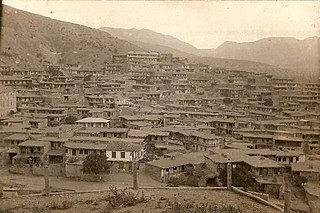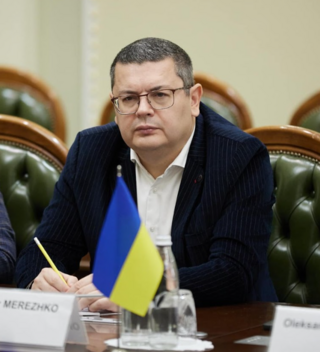Related Research Articles

Chechnya, officially the Chechen Republic, is a republic of Russia. It is situated in the North Caucasus of Eastern Europe, between the Caspian Sea and Black Sea. The republic forms a part of the North Caucasian Federal District, and shares land borders with the country of Georgia to its south; with the Russian republics of Dagestan, Ingushetia, and North Ossetia-Alania to its east, north, and west; and with Stavropol Krai to its northwest.

From 1930 to 1952, the government of the Soviet Union, on the orders of Soviet leader Joseph Stalin under the direction of the NKVD official Lavrentiy Beria, forcibly transferred populations of various groups. These actions may be classified into the following broad categories: deportations of "anti-Soviet" categories of population, deportations of entire nationalities, labor force transfer, and organized migrations in opposite directions to fill ethnically cleansed territories. Dekulakization marked the first time that an entire class was deported, whereas the deportation of Soviet Koreans in 1937 marked the precedent of a specific ethnic deportation of an entire nationality.

Ingushetia or Ingushetiya, officially the Republic of Ingushetia, is a republic of Russia located in the North Caucasus of Eastern Europe. The republic is part of the North Caucasian Federal District, and shares land borders with the country of Georgia to its south; and borders the Russian republics of North Ossetia–Alania to its west and north and Chechnya to its east and northeast.
Ingush, historically known as Durdzuks, Gligvi and Kists, are a Northeast Caucasian ethnic group mainly inhabiting Ingushetia in central Caucasus, but also inhabitanting Prigorodny District and town of Vladikavkaz of modern day North-Ossetia. The Ingush are predominantly Sunni Muslims and speak the Ingush language.

When the Soviet Union existed, different governments had ruled the southern Caucasus regions of Chechnya and Ingushetia. Within the Mountain Autonomous Socialist Soviet Republic, later annexed into the Russian Socialist Federative Soviet Republic, they were known as the Chechen Autonomous Oblast and the Ingush Autonomous Oblast, which were unified on January 15, 1934, to form the Checheno-Ingush Autonomous Oblast. It was elevated to an autonomous republic as the Checheno-Ingush Autonomous Soviet Socialist Republic from 1936 to 1944 and again from 1957 to 1993. Its capital was Grozny.

The Chechen Republic of Ichkeria, known simply as Ichkeria, and also known as Chechnya, was a de facto state that controlled most of the former Checheno-Ingush ASSR.
The 1940–1944 insurgency in Chechnya was an autonomous revolt against the Soviet authorities in the Chechen-Ingush Autonomous Soviet Socialist Republic. Beginning in early 1940 under Hasan Israilov, it peaked in 1942 during the German invasion of North Caucasus and ended in the beginning of 1944 with the wholesale concentration and deportation of the Vainakh peoples from their native lands as well as from the locations across the USSR, resulting in the death of at least 144,000 civilians. However, scattered resistance in the mountains continued for years.

The deportation of the Chechens and Ingush, or Ardakhar Genocide, and also known as Operation Lentil, was the Soviet forced transfer of the whole of the Vainakh populations of the North Caucasus to Central Asia on 23 February 1944, during World War II. The expulsion was ordered by NKVD chief Lavrentiy Beria after approval by Soviet leader Joseph Stalin, as a part of a Soviet forced settlement program and population transfer that affected several million members of ethnic minorities in the Soviet Union between the 1930s and the 1950s.
The Holodomor was a 1932–33 man-made famine in Soviet Ukraine and adjacent Ukrainian-inhabited territories that killed millions of Ukrainians. Opinions and beliefs about the Holodomor vary widely among nations. It is considered a genocide by Ukraine, and Ukraine's Ministry of Foreign Affairs has lobbied for the famine to be considered a genocide internationally. By 2022, the Holodomor was recognized as a genocide by the parliaments of 23 countries and the European Parliament, and it is recognized as a part of the Soviet famine of 1932–1933 by Russia. As of June 2023, 35 countries recognise the Holodomor as a genocide.
On March 20, 2010, a Circassian Congress was held in the Georgian capital of Tbilisi, funded in part by the Circassian members of the Western political analysis center, the Jamestown Foundation and the Ilia State University's International School for Caucasus Studies in Georgia.

Rustem Enverovych Umerov is a Ukrainian politician, businessman, investor, philanthropist and the current Defence Minister of Ukraine. Umerov is a Muslim, and of Crimean Tatar origin.

During the Russian invasion of Ukraine, national parliaments including those of Poland, Ukraine, Canada, Estonia, Latvia, Lithuania and Ireland declared that genocide was taking place. Scholars and commentators including Eugene Finkel, Timothy D. Snyder and Gregory Stanton; and legal experts such as Otto Luchterhandt and Zakhar Tropin, have made claims of varying degrees of certainty that Russia is committing genocide in Ukraine. A comprehensive report by the Raoul Wallenberg Centre for Human Rights concluded that there exists a "very serious risk of genocide" in Russia's invasion of Ukraine.

The Chechen genocide refers to the mass casualties carried out on the Chechen people during the various stages of the Russia–Chechnya conflict since the second half of the 18th to early 21st centuries. The term has no legal effect, although the European Parliament has recognized the 1944 forced deportation of Chechens, which killed an estimated 1/3-1/2 of the total Chechen population, as an act of genocide. The Ukrainian Rada has also condemned Russia's genocide of the Chechen people.

The resolution on recognition of the state sovereignty of the Chechen Republic of Ichkeria was a bill proposed by Oleksiy Honcharenko and Musa Mahomedov in which the Verkhovna Rada, the Ukrainian parliament, would have voted on the recognition of Chechnya's independence, in response to Russia's recognition of the Luhansk People's Republic and the Donetsk People's Republic.

Musa Serhoievych Mahomedov is an Avar-born Ukrainian entrepreneur and politician currently serving as a People's Deputy of Ukraine from Ukraine's 45th electoral district, including the cities of Avdiivka and Yasynuvata and parts of the city of Donetsk, since 2019. He was previously director of the Avdiivka Coke Plant from 2012 to 2019, managing the plant during the height of the war in Donbas. He is the Chairman of the Subcommittee on Industrial Policy of the Verkhovna Rada Committee on Economic Development.

Falkhan is a rural locality in the Dzheyrakhsky District of Ingushetia, Russia. It is part of the Lyazhgi rural settlement.

Oleksandr Oleksandrovich Merezhko is a Ukrainian jurist, doctor of legal sciences, professor, honored lawyer of Ukraine.
The national liberation struggle of the Ingush people was a series of military clashes and uprisings of the Ingush people against the Russian Empire that colonized Ingushetia, as well as protest rallies and actions against the policies of the Russian Federation.

A referendum on creating the Republic of Ingushetia within Russian Federation was held in Ingushetia on 30 November 1991.
Magomed Torijev is a journalist, human rights activist, expert on the North Caucasus and republics of the former Soviet Union. He's a representative of the Ingush opposition in Europe, an authorized representative of the Ingush Independence Committee, an organization whose main goal is to gain independence of Ingushetia from Russia. He worked for Radio Liberty/Free Europe, Prague Watchdog, Ingushetiya.org. He participated in the UN missions to Chechnya and Ingushetia, as well as in the OSCE mission to Ukraine.
References
- ↑ "80 Years Later, Deportation of Chechen and Ingush Peoples Shapes the North Caucasus". 23 February 2024.
- ↑ "The Massive Deportation of the Chechen People: How and why Chechens were Deported". 29 April 2019.
- ↑ Свобода, Радіо (23 February 2024). "У річницю депортації інгушів Рада підтримала постанову на підтримку незалежності Інгушетії". Радіо Свобода.(in Ukrainian)
- ↑ "For Small-Numbered Populations, the Russian State Rewrites History and Denies Memory".
- ↑ "Кримчани та інгуші: як народи, що потрапили під російську окупацію, відстоюють право на свободу".(in Ukrainian)
- ↑ "Інгуські активісти оголосили курс на незалежність Інгушетії". 12 January 2023.(in Ukrainian)
- ↑ "EVENT IN THE MEMORY OF THE 72ND ANNIVERSARY OF THE DEPORTATION OF CHECHEN AND INGUSH PEOPLE".
- ↑ "80 years of deportation of the Chechens and Ingush". 23 February 2024.
- ↑ "Европейский парламент признал "геноцидом" сталинскую депортацию чеченцев и ингушей в Центральную Азию и Сибирь в 1944 году". Радио Свобода. 15 May 2011.(in Russian)
- ↑ "Europe Remembers".
- ↑ "Ingushetia asks for recognition of genocide".
- ↑ "Грузинський парламент обговорить визнання геноциду інгушів".(in Ukrainian)
- ↑ "Обращение ингушского народа к парламенту Грузии с просьбой о признании геноцида".(in Russian)
- ↑ "Закон на перспективу? В Украине предложили признать право ингушей на независимость".(in Russian)
- ↑ "Визнання геноциду інгушського народу".(in Ukrainian)
- ↑ "Ukraine recognises Ingushetia's right to self-determination". 27 February 2024.
- ↑ "Проект Постанови про визнання права інгуського народу на створення незалежної суверенної національної держави, засудження злочинів Росії проти інгушів та відновлення територіальної цілісності Інгушетії".(in Ukrainian)
- ↑ "Рада признала право народа Ингушетии на создание независимого национального государства".(in Russian)
- ↑ "The Resolution of the International Conference dedicated to the 80th anniversary of the deportation of the Chechen and Ingush nations". 5 March 2024.